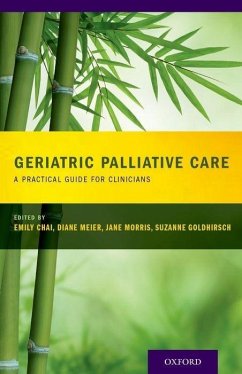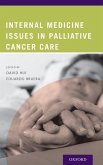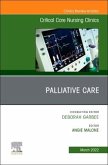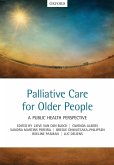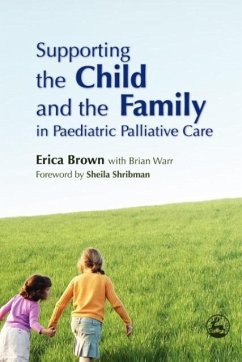Geriatric Palliative Care
A Practical Guide for Clinicians
Herausgeber: Chai, Emily; Morris, Jane; Meier, Diane
Geriatric Palliative Care
A Practical Guide for Clinicians
Herausgeber: Chai, Emily; Morris, Jane; Meier, Diane
- Broschiertes Buch
- Merkliste
- Auf die Merkliste
- Bewerten Bewerten
- Teilen
- Produkt teilen
- Produkterinnerung
- Produkterinnerung
Geriatric Palliative Care is a practical guide for diagnosing and managing end-of-life illnesses, and communicating this information to patients, relatives and clinical team members.
Andere Kunden interessierten sich auch für
![Internal Medicine Issues in Palliative Cancer Care Internal Medicine Issues in Palliative Cancer Care]() David HuiInternal Medicine Issues in Palliative Cancer Care57,99 €
David HuiInternal Medicine Issues in Palliative Cancer Care57,99 €![Communication in Palliative Care Communication in Palliative Care]() Janet DunphyCommunication in Palliative Care130,99 €
Janet DunphyCommunication in Palliative Care130,99 €![Palliative Care, an Issue of Critical Care Nursing Clinics of North America Palliative Care, an Issue of Critical Care Nursing Clinics of North America]() Palliative Care, an Issue of Critical Care Nursing Clinics of North America33,99 €
Palliative Care, an Issue of Critical Care Nursing Clinics of North America33,99 €![Triggering and Increasing Palliative Care Consults in the Emergency Room Triggering and Increasing Palliative Care Consults in the Emergency Room]() Caroline TigereTriggering and Increasing Palliative Care Consults in the Emergency Room23,99 €
Caroline TigereTriggering and Increasing Palliative Care Consults in the Emergency Room23,99 €![Music Therapy in Palliative Care Music Therapy in Palliative Care]() Music Therapy in Palliative Care43,99 €
Music Therapy in Palliative Care43,99 €![Palliative Care for Older People Palliative Care for Older People]() Palliative Care for Older People65,99 €
Palliative Care for Older People65,99 €![Supporting the Child and the Family in Paediatric Palliative Care Supporting the Child and the Family in Paediatric Palliative Care]() Erica BrownSupporting the Child and the Family in Paediatric Palliative Care51,99 €
Erica BrownSupporting the Child and the Family in Paediatric Palliative Care51,99 €-
-
-
Geriatric Palliative Care is a practical guide for diagnosing and managing end-of-life illnesses, and communicating this information to patients, relatives and clinical team members.
Hinweis: Dieser Artikel kann nur an eine deutsche Lieferadresse ausgeliefert werden.
Hinweis: Dieser Artikel kann nur an eine deutsche Lieferadresse ausgeliefert werden.
Produktdetails
- Produktdetails
- Verlag: OUP US
- Seitenzahl: 628
- Erscheinungstermin: 1. April 2014
- Englisch
- Abmessung: 254mm x 178mm x 33mm
- Gewicht: 1163g
- ISBN-13: 9780195389319
- ISBN-10: 019538931X
- Artikelnr.: 37086007
- Herstellerkennzeichnung
- Libri GmbH
- Europaallee 1
- 36244 Bad Hersfeld
- gpsr@libri.de
- Verlag: OUP US
- Seitenzahl: 628
- Erscheinungstermin: 1. April 2014
- Englisch
- Abmessung: 254mm x 178mm x 33mm
- Gewicht: 1163g
- ISBN-13: 9780195389319
- ISBN-10: 019538931X
- Artikelnr.: 37086007
- Herstellerkennzeichnung
- Libri GmbH
- Europaallee 1
- 36244 Bad Hersfeld
- gpsr@libri.de
Emily Chai, M.D., is Associate Professor of Geriatrics and Palliative Medicine at Icahn School of Medicine at Mount Sinai, New York. Diane Meier, MD, FACP, is Professor of Geriatrics and Palliative Medicine at the Icahn School of Medicine at Mount Sinai, New York. Jane Morris, MS, RN, ACHPN, is the Clinical Coordinator for Palliative Care at New York Hospital, Queens, New York. Suzanne Goldhirsch, MA, MsED, is a Program Coordinator for Geriatrics and Palliative Medicine at the Icahn School of Medicine at Mount Sinai, New York.
Section 1: Overview
1. Introduction to Geriatric Palliative Care
2. Principles of Care
3. Medication Management
4. Introduction to Caregiving
5. Financing Palliative Care and Hospice
6. Ethical Decision-Making
7. Prognostication
8. Advance Care Planning
9. Communication Skills
10. Managing Conflict
11. Care Transitions
12. The Hospice Model of Palliative Care
13. Insurance
Section 2: Special Issues in Geriatric Palliative Care
14. Palliative Care Emergencies
15. Dying at Home
16. Cultural Considerations
17. Complementary and Alternative Therapies
18. Clinician Self Care
19. Last Hours of Living
20. Bereavement
21. Spirituality
22. Palliative Sedation
23. Requests for Hastened Death
24. Assistive Aids and Devices
25. Rehabilitation
26. Mechanical Ventilation
27. Artificial Nutrition and Hydration
Section 3: Caregivers
28. Caregiving
Section 4: Symptoms
29. Pain Management
30. Fatigue
31. Failure to Thrive
32. Sweating and Fever
33. Behavioral Disorders in Dementia
34. Delirium
35. Terminal Delirium
36. Sleep Disorders
37. Dizziness
38. Headache
39. Myoclonus
40. Cough and Secretion
41. Dyspnea
42. Anorexia and Cachexia
43. Ascites
44. Bowel Obstruction
45. Constipation
46. Diarrhea and Fecal Incontinence
47. Mucositis
48. Dyspepsia
49. Dysphagia
50. Encephalopathy
51. Gastroparesis
52. Hiccups
53. Nausea and Vomiting
54. Urinary Retention
55. Urinary Incontinence
56. Bleeding
57. Thromboses
58. Lymphoedema
59. Pressure Ulcers
60. Pruritus
61. Malodorous Wounds
Section 5: Diseases and Syndromes
62. Frailty
63. Falls
64. Depression
65. Anxiety
66. Alcohol Abuse and Dependence
67. Dementia
68. Seizure
69. Stroke
70. Parkinson Disease and Essential Tremor
71. Malignant Spinal Cord Compression
72. End Stage Lung Disease
73. Aspiration Pneumonia
74. Diverticulitis
75. Mesentric Ischemia
76. End Stage Liver Disease
77. Feeding Tube Management
78. End Stage Renal Disease
79. Recurrent Urinary Tract Infection
80. Diabetic Management in Advanced Illness
81. End Stage Heart Disease
82. Arrhythmias
83. Valvular Heart Disease
84. Peripheral Arterial Disease
85. Hip Fracture Management
86. Osteoarthritis
87. Lumbar Spinal Stenosis
88. Osteoporotic Fracture
89. Polymyalgia Rheumatica
90. Rheumatoid Arthritis
91. Osteomyelitis
92. Herpes Zoster
93. HIV-AIDS
94. Skin Cancers
95. Colorectal Cancer
96. Head and Neck Cancer
97. Breast Cancer
98. Prostate Cancer
99. Lung Cancer
100. Leukemia
101. Lymphoma
102. Intracranial Malignancies
Section 6: The Interdisciplinary Team
103. Clinical Psychologist
104. Complementary and Alternative Practitioners
105. Dietician
106. Massage Therapist
107. Music Therapist
108. Registered Nurse
109. Physical Therapist
110. Pharmacist
111. Physician
112. Social
113. Speech and Language Pathologist
114. Chaplain
1. Introduction to Geriatric Palliative Care
2. Principles of Care
3. Medication Management
4. Introduction to Caregiving
5. Financing Palliative Care and Hospice
6. Ethical Decision-Making
7. Prognostication
8. Advance Care Planning
9. Communication Skills
10. Managing Conflict
11. Care Transitions
12. The Hospice Model of Palliative Care
13. Insurance
Section 2: Special Issues in Geriatric Palliative Care
14. Palliative Care Emergencies
15. Dying at Home
16. Cultural Considerations
17. Complementary and Alternative Therapies
18. Clinician Self Care
19. Last Hours of Living
20. Bereavement
21. Spirituality
22. Palliative Sedation
23. Requests for Hastened Death
24. Assistive Aids and Devices
25. Rehabilitation
26. Mechanical Ventilation
27. Artificial Nutrition and Hydration
Section 3: Caregivers
28. Caregiving
Section 4: Symptoms
29. Pain Management
30. Fatigue
31. Failure to Thrive
32. Sweating and Fever
33. Behavioral Disorders in Dementia
34. Delirium
35. Terminal Delirium
36. Sleep Disorders
37. Dizziness
38. Headache
39. Myoclonus
40. Cough and Secretion
41. Dyspnea
42. Anorexia and Cachexia
43. Ascites
44. Bowel Obstruction
45. Constipation
46. Diarrhea and Fecal Incontinence
47. Mucositis
48. Dyspepsia
49. Dysphagia
50. Encephalopathy
51. Gastroparesis
52. Hiccups
53. Nausea and Vomiting
54. Urinary Retention
55. Urinary Incontinence
56. Bleeding
57. Thromboses
58. Lymphoedema
59. Pressure Ulcers
60. Pruritus
61. Malodorous Wounds
Section 5: Diseases and Syndromes
62. Frailty
63. Falls
64. Depression
65. Anxiety
66. Alcohol Abuse and Dependence
67. Dementia
68. Seizure
69. Stroke
70. Parkinson Disease and Essential Tremor
71. Malignant Spinal Cord Compression
72. End Stage Lung Disease
73. Aspiration Pneumonia
74. Diverticulitis
75. Mesentric Ischemia
76. End Stage Liver Disease
77. Feeding Tube Management
78. End Stage Renal Disease
79. Recurrent Urinary Tract Infection
80. Diabetic Management in Advanced Illness
81. End Stage Heart Disease
82. Arrhythmias
83. Valvular Heart Disease
84. Peripheral Arterial Disease
85. Hip Fracture Management
86. Osteoarthritis
87. Lumbar Spinal Stenosis
88. Osteoporotic Fracture
89. Polymyalgia Rheumatica
90. Rheumatoid Arthritis
91. Osteomyelitis
92. Herpes Zoster
93. HIV-AIDS
94. Skin Cancers
95. Colorectal Cancer
96. Head and Neck Cancer
97. Breast Cancer
98. Prostate Cancer
99. Lung Cancer
100. Leukemia
101. Lymphoma
102. Intracranial Malignancies
Section 6: The Interdisciplinary Team
103. Clinical Psychologist
104. Complementary and Alternative Practitioners
105. Dietician
106. Massage Therapist
107. Music Therapist
108. Registered Nurse
109. Physical Therapist
110. Pharmacist
111. Physician
112. Social
113. Speech and Language Pathologist
114. Chaplain
Section 1: Overview
1. Introduction to Geriatric Palliative Care
2. Principles of Care
3. Medication Management
4. Introduction to Caregiving
5. Financing Palliative Care and Hospice
6. Ethical Decision-Making
7. Prognostication
8. Advance Care Planning
9. Communication Skills
10. Managing Conflict
11. Care Transitions
12. The Hospice Model of Palliative Care
13. Insurance
Section 2: Special Issues in Geriatric Palliative Care
14. Palliative Care Emergencies
15. Dying at Home
16. Cultural Considerations
17. Complementary and Alternative Therapies
18. Clinician Self Care
19. Last Hours of Living
20. Bereavement
21. Spirituality
22. Palliative Sedation
23. Requests for Hastened Death
24. Assistive Aids and Devices
25. Rehabilitation
26. Mechanical Ventilation
27. Artificial Nutrition and Hydration
Section 3: Caregivers
28. Caregiving
Section 4: Symptoms
29. Pain Management
30. Fatigue
31. Failure to Thrive
32. Sweating and Fever
33. Behavioral Disorders in Dementia
34. Delirium
35. Terminal Delirium
36. Sleep Disorders
37. Dizziness
38. Headache
39. Myoclonus
40. Cough and Secretion
41. Dyspnea
42. Anorexia and Cachexia
43. Ascites
44. Bowel Obstruction
45. Constipation
46. Diarrhea and Fecal Incontinence
47. Mucositis
48. Dyspepsia
49. Dysphagia
50. Encephalopathy
51. Gastroparesis
52. Hiccups
53. Nausea and Vomiting
54. Urinary Retention
55. Urinary Incontinence
56. Bleeding
57. Thromboses
58. Lymphoedema
59. Pressure Ulcers
60. Pruritus
61. Malodorous Wounds
Section 5: Diseases and Syndromes
62. Frailty
63. Falls
64. Depression
65. Anxiety
66. Alcohol Abuse and Dependence
67. Dementia
68. Seizure
69. Stroke
70. Parkinson Disease and Essential Tremor
71. Malignant Spinal Cord Compression
72. End Stage Lung Disease
73. Aspiration Pneumonia
74. Diverticulitis
75. Mesentric Ischemia
76. End Stage Liver Disease
77. Feeding Tube Management
78. End Stage Renal Disease
79. Recurrent Urinary Tract Infection
80. Diabetic Management in Advanced Illness
81. End Stage Heart Disease
82. Arrhythmias
83. Valvular Heart Disease
84. Peripheral Arterial Disease
85. Hip Fracture Management
86. Osteoarthritis
87. Lumbar Spinal Stenosis
88. Osteoporotic Fracture
89. Polymyalgia Rheumatica
90. Rheumatoid Arthritis
91. Osteomyelitis
92. Herpes Zoster
93. HIV-AIDS
94. Skin Cancers
95. Colorectal Cancer
96. Head and Neck Cancer
97. Breast Cancer
98. Prostate Cancer
99. Lung Cancer
100. Leukemia
101. Lymphoma
102. Intracranial Malignancies
Section 6: The Interdisciplinary Team
103. Clinical Psychologist
104. Complementary and Alternative Practitioners
105. Dietician
106. Massage Therapist
107. Music Therapist
108. Registered Nurse
109. Physical Therapist
110. Pharmacist
111. Physician
112. Social
113. Speech and Language Pathologist
114. Chaplain
1. Introduction to Geriatric Palliative Care
2. Principles of Care
3. Medication Management
4. Introduction to Caregiving
5. Financing Palliative Care and Hospice
6. Ethical Decision-Making
7. Prognostication
8. Advance Care Planning
9. Communication Skills
10. Managing Conflict
11. Care Transitions
12. The Hospice Model of Palliative Care
13. Insurance
Section 2: Special Issues in Geriatric Palliative Care
14. Palliative Care Emergencies
15. Dying at Home
16. Cultural Considerations
17. Complementary and Alternative Therapies
18. Clinician Self Care
19. Last Hours of Living
20. Bereavement
21. Spirituality
22. Palliative Sedation
23. Requests for Hastened Death
24. Assistive Aids and Devices
25. Rehabilitation
26. Mechanical Ventilation
27. Artificial Nutrition and Hydration
Section 3: Caregivers
28. Caregiving
Section 4: Symptoms
29. Pain Management
30. Fatigue
31. Failure to Thrive
32. Sweating and Fever
33. Behavioral Disorders in Dementia
34. Delirium
35. Terminal Delirium
36. Sleep Disorders
37. Dizziness
38. Headache
39. Myoclonus
40. Cough and Secretion
41. Dyspnea
42. Anorexia and Cachexia
43. Ascites
44. Bowel Obstruction
45. Constipation
46. Diarrhea and Fecal Incontinence
47. Mucositis
48. Dyspepsia
49. Dysphagia
50. Encephalopathy
51. Gastroparesis
52. Hiccups
53. Nausea and Vomiting
54. Urinary Retention
55. Urinary Incontinence
56. Bleeding
57. Thromboses
58. Lymphoedema
59. Pressure Ulcers
60. Pruritus
61. Malodorous Wounds
Section 5: Diseases and Syndromes
62. Frailty
63. Falls
64. Depression
65. Anxiety
66. Alcohol Abuse and Dependence
67. Dementia
68. Seizure
69. Stroke
70. Parkinson Disease and Essential Tremor
71. Malignant Spinal Cord Compression
72. End Stage Lung Disease
73. Aspiration Pneumonia
74. Diverticulitis
75. Mesentric Ischemia
76. End Stage Liver Disease
77. Feeding Tube Management
78. End Stage Renal Disease
79. Recurrent Urinary Tract Infection
80. Diabetic Management in Advanced Illness
81. End Stage Heart Disease
82. Arrhythmias
83. Valvular Heart Disease
84. Peripheral Arterial Disease
85. Hip Fracture Management
86. Osteoarthritis
87. Lumbar Spinal Stenosis
88. Osteoporotic Fracture
89. Polymyalgia Rheumatica
90. Rheumatoid Arthritis
91. Osteomyelitis
92. Herpes Zoster
93. HIV-AIDS
94. Skin Cancers
95. Colorectal Cancer
96. Head and Neck Cancer
97. Breast Cancer
98. Prostate Cancer
99. Lung Cancer
100. Leukemia
101. Lymphoma
102. Intracranial Malignancies
Section 6: The Interdisciplinary Team
103. Clinical Psychologist
104. Complementary and Alternative Practitioners
105. Dietician
106. Massage Therapist
107. Music Therapist
108. Registered Nurse
109. Physical Therapist
110. Pharmacist
111. Physician
112. Social
113. Speech and Language Pathologist
114. Chaplain

